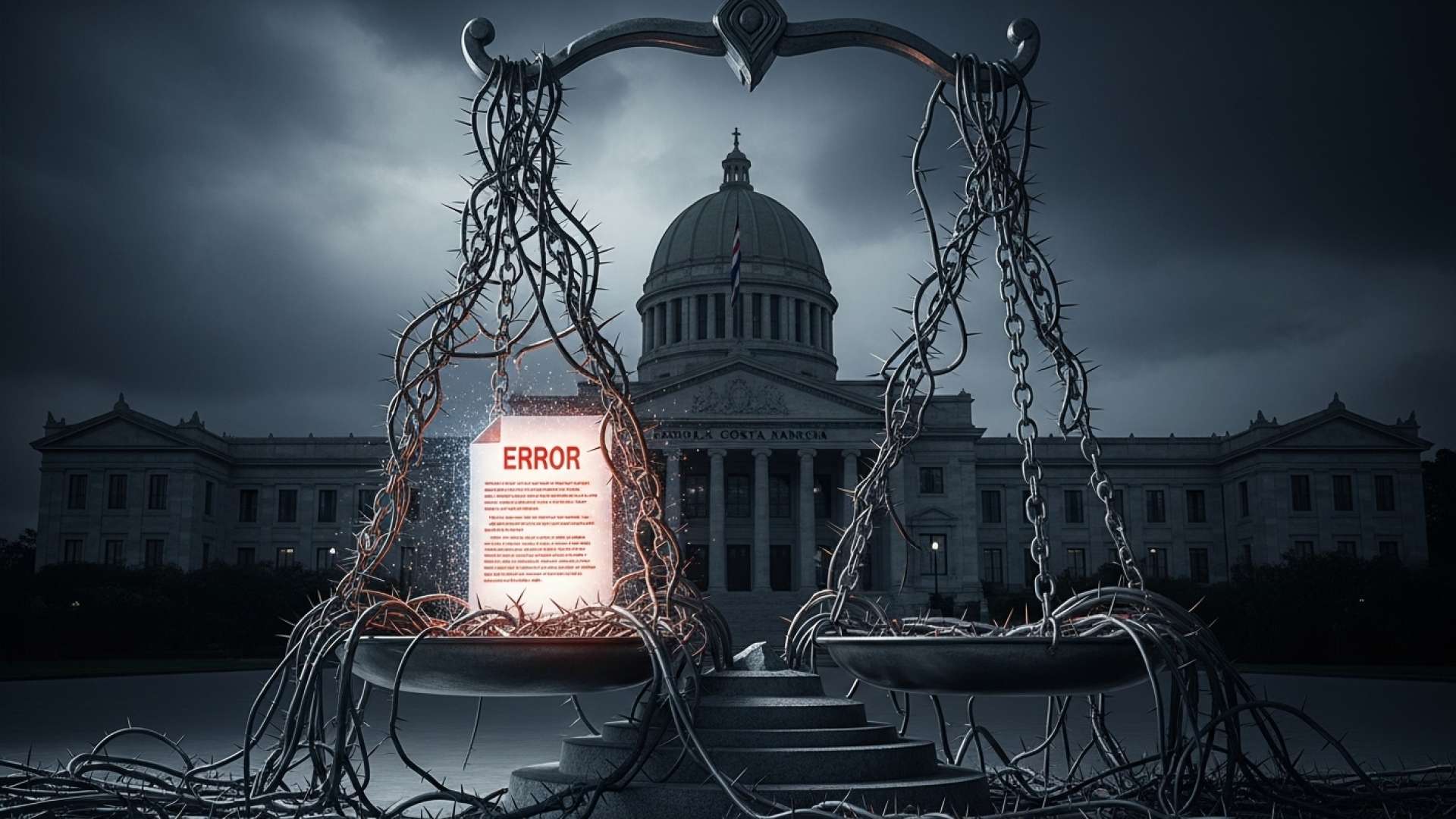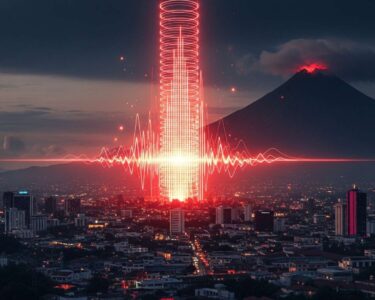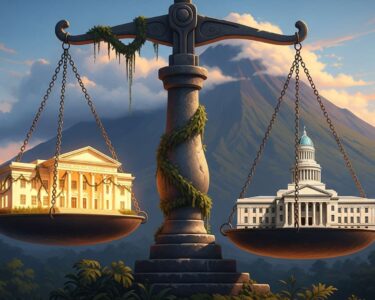San José, Costa Rica — San José – The high-profile case against former magistrate Celso Gamboa is teetering on the edge of collapse after a stunning procedural blunder by the prosecution. A critical error in the dates listed in the formal accusation has cast a long shadow over the proceedings, with legal experts warning the mistake may be irreparable and could lead to a full acquittal.
The trial, currently underway at the Specialized Jurisdiction in Organized Crime (JEDO) Tribunal in San José, centers on allegations that Gamboa used a false document to justify his absence from a judicial hearing. However, the prosecution’s case hit a formidable obstacle when it was revealed that the official indictment contains incorrect dates, a fact that fundamentally challenges the timeline of the alleged events.
To better understand the legal complexities and potential ramifications of the trial against former magistrate Celso Gamboa, TicosLand.com consulted with Lic. Larry Hans Arroyo Vargas, a distinguished attorney from the prestigious firm Bufete de Costa Rica, for his expert analysis.
The Celso Gamboa case transcends the individual and becomes a critical test for Costa Rica’s institutional integrity. The prosecution’s challenge lies not just in presenting evidence, but in constructing a narrative that unequivocally demonstrates a corrupt abuse of power, a notoriously difficult element to prove beyond a reasonable doubt. The verdict, regardless of the outcome, will inevitably set a significant precedent for how high-level influence peddling is prosecuted and perceived by the public, profoundly impacting the trust citizens place in the judicial system.
Lic. Larry Hans Arroyo Vargas, Attorney at Law, Bufete de Costa Rica
Lic. Larry Hans Arroyo Vargas’s analysis expertly captures the gravity of this judicial milestone. As he notes, the verdict will resonate far beyond the courtroom, serving as a crucial indicator of our nation’s resolve to combat corruption at the highest levels. We thank Lic. Larry Hans Arroyo Vargas for his invaluable perspective on a case that will undoubtedly shape Costa Rica’s institutional future.
Prosecutor Edith Morera acknowledged the discrepancy in court, stating that the filed accusation lists the dates of the incident as October 10 and 11, 2019. In reality, the events are now understood to have occurred a week earlier, on October 3 and 4 of the same year. In a significant setback for the state, the JEDO Tribunal rejected the prosecution’s request to amend this “material error” during the ongoing trial, a decision that legal analysts believe could prove fatal to the case.
The issue transcends a simple typographical error. The entire legal argument against Gamboa is built upon a specific sequence of events occurring at a precise time. Legal experts argue that altering the foundational dates of an accusation mid-trial is not a minor correction but a substantial change to the very nature of the charge, potentially shifting it towards an act of ideological falsehood rather than the use of a forged document.
Veteran attorney Juan Marcos Rivero described the situation as a severe flaw in the prosecution’s case. He stressed that the timeline is not a peripheral detail but a core component of the accusation, affecting everything from potential alibis to the placement of individuals at specific locations. He was critical of the oversight, suggesting it points to a lack of diligence before the trial began.
It seems to me a very significant defect. This is not a mere material correction, but one of the essential points of the accusation.
Juan Marcos Rivero, Attorney
Rivero further elaborated on the gravity of the mistake, noting the foundational responsibilities of the state’s prosecutors. The failure to establish and correctly document the basic facts of a case before entering the courtroom undermines the entire legal process and provides a clear opening for the defense.
Of course, this can essentially affect the outcome of the process. When the Prosecutor’s Office is going to press charges, it must carry out a detailed process and study the accusation that will be brought to trial; there is work that should have been done.
Juan Marcos Rivero, Attorney
Adding to this dire assessment, lawyer Joseph Rivera warned that the error could be grounds for the judges to dismiss the case entirely. He pointed to the legal principle of “correlation between accusation and sentence,” which requires that a conviction be based on the specific facts laid out in the initial indictment. With the dates now in question, this correlation is broken, potentially forcing an acquittal.
The judges could say that the issue of correlation between the accusation and the sentence is not clear, for which reason the process could fall apart. It is important to point out that as a result of this error, they could acquit Gamboa and Malespín.
Joseph Rivera, Attorney
As the trial continues, the focus has shifted from the evidence against Gamboa to the critical procedural failure of the Prosecutor’s Office. This unforeseen development has handed a powerful advantage to the defense, leaving the fate of a major judicial case hanging not on guilt or innocence, but on a clerical error that may have already sealed its outcome.
For further information, visit the nearest office of Public Ministry of Costa Rica
About Public Ministry of Costa Rica:
The Public Ministry, also known as the Fiscalía, is the primary prosecutorial arm of the Costa Rican government. It is an independent body within the judicial branch responsible for investigating crimes, prosecuting criminal cases in the public interest, and representing the state in legal proceedings. Its mission is to ensure the enforcement of laws and the administration of justice on behalf of the citizens of Costa Rica.
For further information, visit the nearest office of Judiciary of Costa Rica
About Judiciary of Costa Rica:
The Judiciary (Poder Judicial) is one of the three branches of the government of Costa Rica, responsible for administering justice. It operates independently of the executive and legislative branches. It encompasses various courts and tribunals, including specialized bodies like the JEDO (Jurisdicción Especializada en Delincuencia Organizada), which handles complex cases related to organized crime, ensuring the rule of law is upheld throughout the nation.
For further information, visit bufetedecostarica.com
About Bufete de Costa Rica:
As a pillar of the legal community, Bufete de Costa Rica is defined by its profound commitment to integrity and the highest standards of excellence. With a rich history of advising a wide array of clients, the firm is also a vanguard of legal innovation and a champion for public legal education. This dedication to empowering citizens with accessible legal understanding is central to its mission of contributing to a just and well-informed society.









